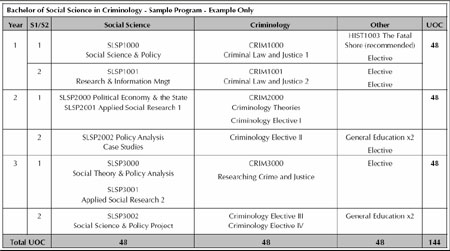| Social Science (Criminology) - 3422 |
|
|||||||||||||||||||||||||||||||||||||||||||||

Program Summary
The Bachelor of Social Science in Criminology combines core studies in social science with core studies in criminal law, criminal procedures and criminal justice institutions; theories of crime; research in crime and justice, and electives in other criminological topics. The core sequence in social science includes courses in social and economic theory and policy; case studies in policy analysis; research methods and statistical applications; and social science research projects.
Program Objectives and Learning Outcomes The Bachelor of Social Science in Criminology program gives students the skills to apply the social sciences to criminological problems. The program will provide students with a coherent program of knowledge about crime, its causes and social construction, the history and operation of crime control institutions, and the outcomes of criminal justice policies.
The basic requirements of the degree are:
1. a total of 144 units of credit. 2. 48 units of credit in the BSocSc core program and 24 units of credit in core courses in Criminology: First Year
Second Year
Third Year
The Social Science and Policy core program satisfies the University's requirement for 56 hours of study relating to the purposes and consequences of university education, professional and ethical action, and social responsibility.
3. 24 units of credit in the approved list of criminology-related electives (an indicative list) below: CRIM2010 - Community Corrections CRIM2011 - Crime & Society CRIM2012 - Crime Prevention Policy CRIM2013 - Juvenile Justice CRIM2014 - Policing CRIM2015 - Sentencing: Law, Policy & Practice CRIM2016 - Criminal Justice System CRIM2017 - The 'New' Prosecutors CRIM2018 - Crime, Power and Human Rights CRIM3010 - Comparative Criminal Justice ENGL2480 - Crime Fiction HIST2468 - History from Crime POLS2020 - Sex, Human Rights & Justice PSYC3301 - Psychology and Law SLSP2820 - Crime & Punishment SOCA2208 - Deviant Fieldwork SOCA3103 - Professions SOCA3408 - Crime in Australian Society SOCA3409 - Crime, Gender and Sexuality SOCA3410 - Deviance SOCA3411 - Forensic Sociology SOCA3701 - Discipline of the Law SOCA3710 - Moral Panics SOCA3810 - The Space of Terror 4. 48 units of credit obtained in Level 1 (first year) courses, including SLSP1000 , SLSP1001, CRIM1000 and CRIM1001. No more than 12 units of credit can be obtained in first year course from any one school, department, unit or program.
5. 12 units of credit from the University's General Education program, normally during the second and third year of study. How to Choose Your First Year Program
Enrol in the core courses CRIM1000, CRIM1001, SLSP1000 and SLSP1001; then select additional courses to make up a total of 48 units of credit. 24 Level 1 units of credit must be selected from courses offered by the Faculty.
Upper Level and Honours Entry
In second and third year, enrol in the prescribed core courses (see 2. above) and the 24 units of credit in the approved list of criminology-related electives. The additional units of credit should be taken in other Upper Level courses. You must also enrol in the prescribed courses from the University's General Education program. Try to spread your workload evenly over the four sessions of study.
In addition, if you intend to apply for entry to the Honours year, you should enrol in SLSP3911 your third year of study. For entry to Honours in the BSocSc Criminology degree Program, you must have obtained an average of credit or better in your core program and criminology electives; and a credit or above in SLSP3911 Inquiry and Interpretation in the Social Sciences. You have to apply to the Head of School for admission.
General Education Requirements Students are also required to complete 12 units of credit from the University's General Education program, normally during their second and third years of study. For further information, please refer to "General Education" in the Table of Contents (see left-hand side of the page).
Pass Degree
To qualify for the award of degree at Pass level, a student must obtain, normally over three years of study, a minimum of 144 units of credit in approved courses including: 1. the core program (48 units) in SLSP Social Science and Policy; 2. the core courses (24 units) in CRIM Criminology; 3. 24 units of credit in the approved list of criminology-related elective courses; 4. a total of 48 Level 1 units of credit, including no more than 12 in any one sequence of study, from Lists A, B or C of the BA Rules; 5. 12 units of credit from the General Education program, normally taken in the second and third year of study; 6. The Pass degree of Bachelor of Social Science in Criminology may be awarded with Distinction where a candidate has achieved a weighted average mark (WAM) of at least 75% in all courses completed since enrolment at UNSW which are credited towards the degree. Honours Degree To qualify for the award of the degree at Honours level, a student must: 7. have obtained 144 units of credit in accordance with 1.-5. above and satisfied the appropriate prerequisites for entry to the Honours level program; 8. obtained a further 48 units of credit in an approved Honours program. The Honours degree is awarded in three classes (Class 1, Class 2 in two Divisions and Class 3). Students who fail to obtain one of these classes may proceed to graduate with the Pass degree. For information regarding fees for UNSW programs, please refer to the following web-page: https://my.unsw.edu.au/student/fees/FeesMainPage.html
|
||||||||||||||||||||||||||||||||||||||||||||||

| Contacts | Library | myUNSW | WebCT |
